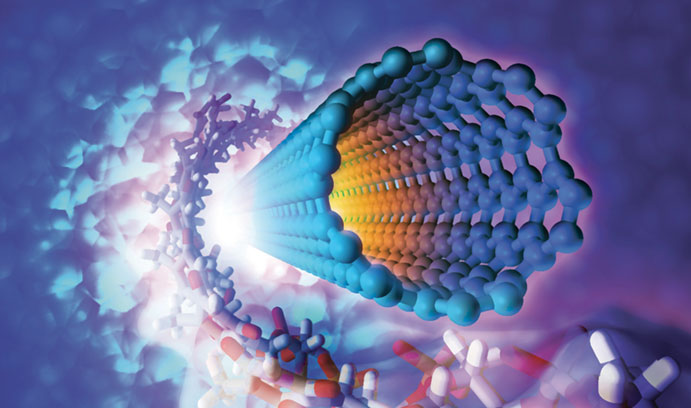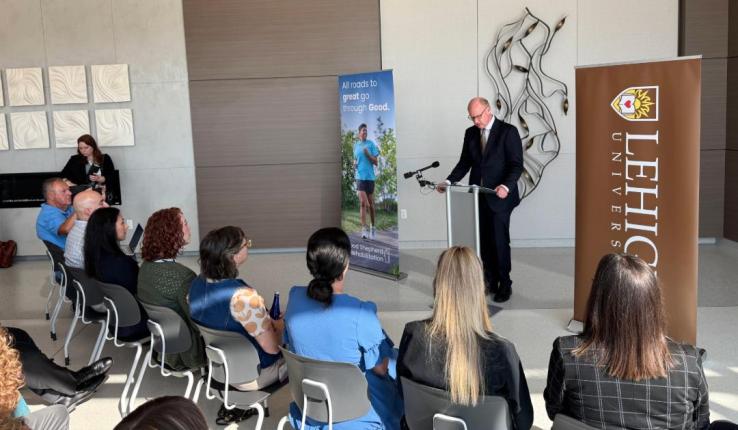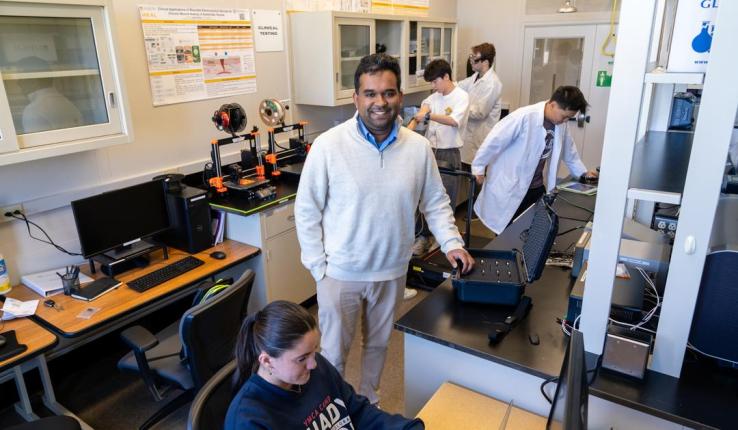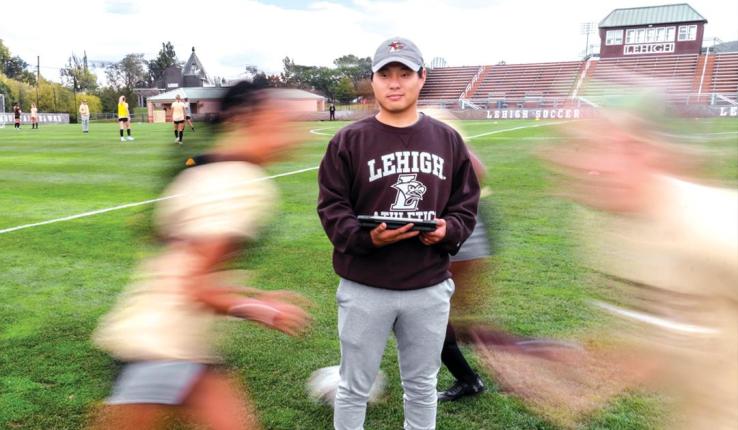A Step Forward in Bioengineering

The potential for DNA to sort carbon nanotubes is one of many interdisciplinary research projects being investigated by faculty members and students in Lehigh’s department of bioengineering. (Illustration courtesy of the Rossin College)
Lehigh has established a new Department of Bioengineering in the P.C. Rossin College of Engineering and Applied Science. The new department will build on Lehigh’s popular bioengineering undergraduate and graduate programs, which were initiated in 2002 and 2009, and on the extensive interdisciplinary bioengineering research being pursued across the Rossin College and the university.
The initial departmental faculty includes 17 members with academic appointments in the department and an additional 17 affiliated members. Their research is supported by the National Institutes of Health, the National Science Foundation, the U.S. Department of Defense and the U.S. Department of Energy, among others. In keeping with the interdisciplinary nature of bioengineering, many of the bioengineering faculty members will have joint appointments in other departments in the Rossin College and in the College of Arts and Sciences.
According to Anand Jagota, professor and founding chair of the department, the formal designation of bioengineering as a department reflects the importance of the field, as well as its emergence and development at Lehigh over the past 15 years.
“The field of bioengineering was born out of a combination of elements from other well-established disciplines,” said Jagota. “In recent years, it has developed its own language, its own tools, its own ‘gravitational pull,’ so to speak. Thus, the timing is right for Lehigh to recognize this evolution by organizing the faculty and students working in this space into a self-standing department.”
According to Jagota, advances in molecular and cellular engineering, regenerative medicine, bioinformatics, imaging and analysis, biosensors and microfluidics, computational bioengineering, and related areas have fundamentally changed the field’s ethos over the past 15–20 years.
“Today’s advances in bioengineering are coming largely from our improved understanding of molecular and cellular biology,” he said. “Contributing in this space also requires a great depth of engineering knowledge to design systems, to perform analysis and to be quantitative at this level.
“These developments, along with parallel advancement in computing and information science over the same time period, have made the engineering perspective even more crucial in the field of human health and healthcare.”
“The creation of the new Department of Bioengineering is an important advancement for our college and university,” says Stephen P. DeWeerth, professor and dean of the Rossin College. “Biomedicine and health are among the most important areas for sustained growth in research and education across the engineering and computing disciplines.
“This importance is amplified at Lehigh, as we move toward the creation of a new college focused on integrated health. The bioengineering department will form an essential conduit for interdisciplinary partnership between the two colleges.”
Bioengineering @ Lehigh
Through the new department, Lehigh will continue to expand its successful B.S., M.S. and Ph.D. programs in bioengineering and to expand its research in areas including biocomputation and modeling; diagnostics, sensors and devices; and materials and therapies.
“We have strong concentrations of people conducting research in devices, optics and microfluidics, and in biomaterials and biomechanics,” said Jagota, “and we are building strength in biocomputation, data, and modeling.”
In recent years, Lehigh’s bioengineering researchers have achieved notable successes. Some examples:
• Wonpil Im (biological sciences) designs dynamic simulations to model complex biomolecular systems, including glycoconjugates, the interactions between proteins and peptides and the interactions between proteins and bacterial membranes. Im’s goal is to help develop novel antibiotics to fight drug-resistant bacteria. His CHARMM-GUI, a web-based graphical user interface, generates molecular simulation systems in a few minutes or hours.
• Lesley Chow (materials science and engineering) and Hannah Dailey (mechanical engineering and mechanics) are customizing lattices with bioactive surfaces, using a computerized robot that is customized into a specialized 3D printer. When the lattices are inserted in the body, polymer scaffolding provides structural integrity, while bioactive functional groups attached to the surface attract the types of cells needed to promote the desired healing activity. The team is collaborating with orthopedic surgeons at St. Luke’s University Health Network in Bethlehem.
• Chao Zhou (electrical and computer engineering) develops ultrahigh-speed and ultrahigh-resolution OCT (optical coherence tomography) and OCM (optical coherence microscopy) technologies to perform real-time 3D pathological analysis, cancer imaging, tissue engineering and brain function imaging. Zhou and his colleagues have built a microscope that paces the heart of a fruit fly without touching it. Their goal is to develop a laser pacemaker that can stimulate the human heart noninvasively with light signals.
• Bryan Berger (chemical and biomolecular engineering) is designing proteins based on templates found in nature as biosurfactants to boost drug solubility. His goal is to engineer switchable functions such as pH-dependent stability to target the delivery of a drug to diseased sites in the body. His group is also developing new methods for scale-up of biosurfactants for eventual large-scale biomanufacturing.
Lehigh bioengineering’s undergraduate students also have a record of accomplishment, said Jagota. Bioengineering majors have taken first prize the past two years in the Rossin College’s annual David and Lorraine Freed Undergraduate Research Symposium. Shannon Hayes, the 2017 winner, impressed judges with her research in antibacterial resistance, while Lauren Boller took the 2016 prize for her work in unravelling the mechanics of epilepsy.
And in 2015, an interdisciplinary bioengineering/mechanical engineering student team designed a device that helps patients determine whether their HIV medication is working. The team took first place in the Design by Biomedical Undergraduate Teams (DEBUT) Challenge, which is sponsored by the National Institutes of Health (NIH). Two of that team’s bioengineers were selected as finalists in the 2015 Collegiate Inventors Competition sponsored by the National Inventors Hall of Fame.
Jagota said that the 2017 meeting of the international Biomedical Engineering Society (BMES), set for October 11-14 in Phoenix, Arizona, will serve as a “launch party” for the new department to engage with its peers in the field’s research and academic community.
“BMES is the premier annual gathering of biomedical engineering and bioengineering researchers from across academia, industry, and government,” he said. “It’s the perfect venue to announce this next stage of Lehigh’s evolution in this space.”
Story by Editorial Services
Posted on:




